
The San Antonio Spurs have been dominant for the past 20 years. They won a total of 5 NBA championships, all of which are attributed to Tim Duncan and head coach Gregg Popovich. Players like David Robinson, Manu Ginobili and Tony Parker are also the most contributing players in these teams, and they are all considered to be one of the best players in league history.
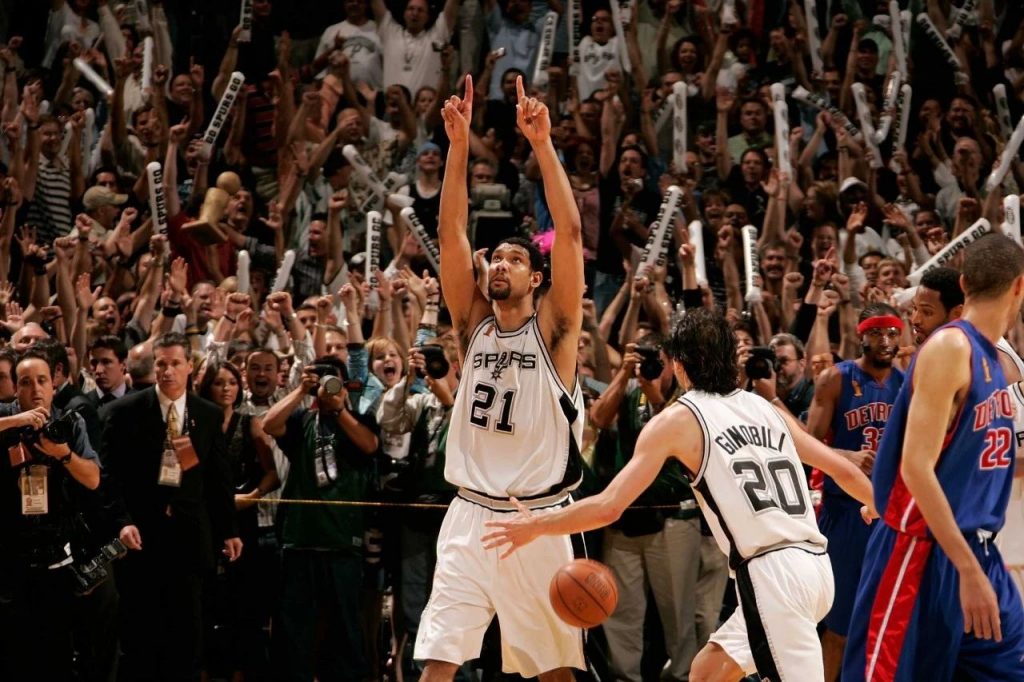
In each NBA Finals, a Finals MVP will be selected, so the Spurs also have five. These five guys all staged unforgettable performances, some of which were unprecedented performances—one of them even won the FMVP trophy three times. To be able to get the MVP of the finals, there must be something extraordinary, with outstanding performance in the game.
If we are to judge who is the best performer, it is indeed a bit difficult. They are all their own children. Why do we need to judge who is the best? Besides, the championship is the honor of the entire team, and some things cannot be said by data alone. So today, in order to avoid too many disputes, we only compare the high and low from the data aspect.
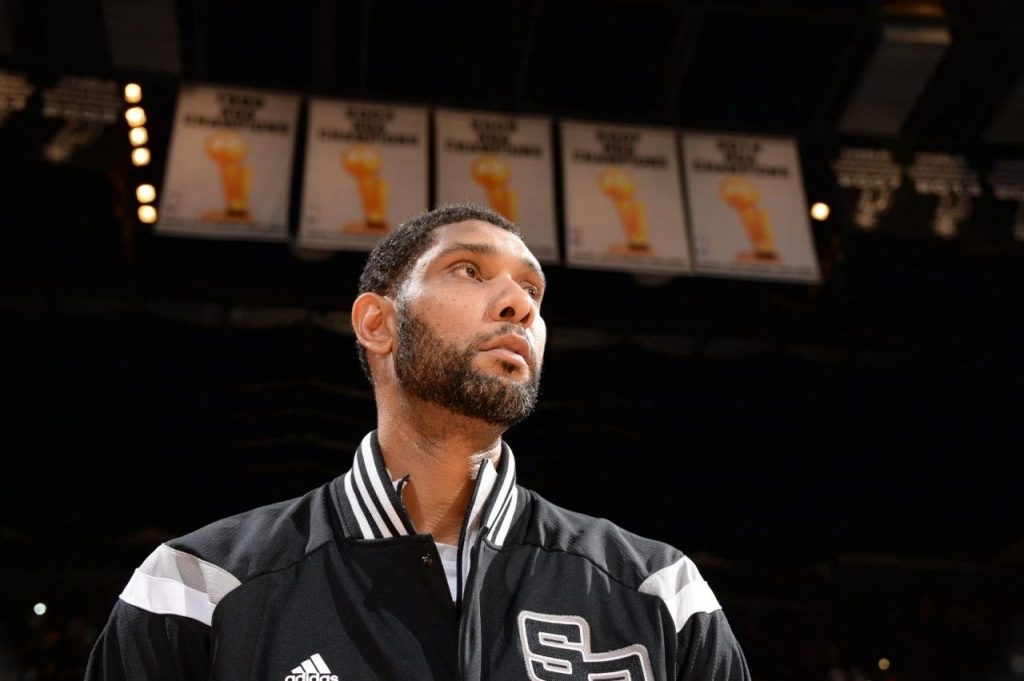
Tim Duncan in 2005 Tim Duncan has a lot of highlights here, yes, he is the guy who won the Finals MVP three times out of the Spurs’ five championships—and won this last time The trophy was in the 2005 finals.
Duncan dominated the Finals in 2005. Maybe he was not as unstoppable as in 1999 and 2003, but he still averaged 20 points and 14 rebounds per game. In the first game against the Detroit Pistons, he scored 24 points and 17 rebounds.

You know, the final score of that game was 84:69, facing the league’s second-ranked defensive Pistons. Under the double care of Wallace and McDyess, Duncan’s 24 points are not like today’s 24 points.
There is no gold content. It is worth mentioning that Manu scored 26 points and 9 rebounds in this game. The offensive end is ever successful, and the defensive end is impeccable, because the Pistons’ starting double Wallace only scored 11 points in this game. Throughout the series, power forward Rasheed Wallace even averaged only 10.9 points per game.
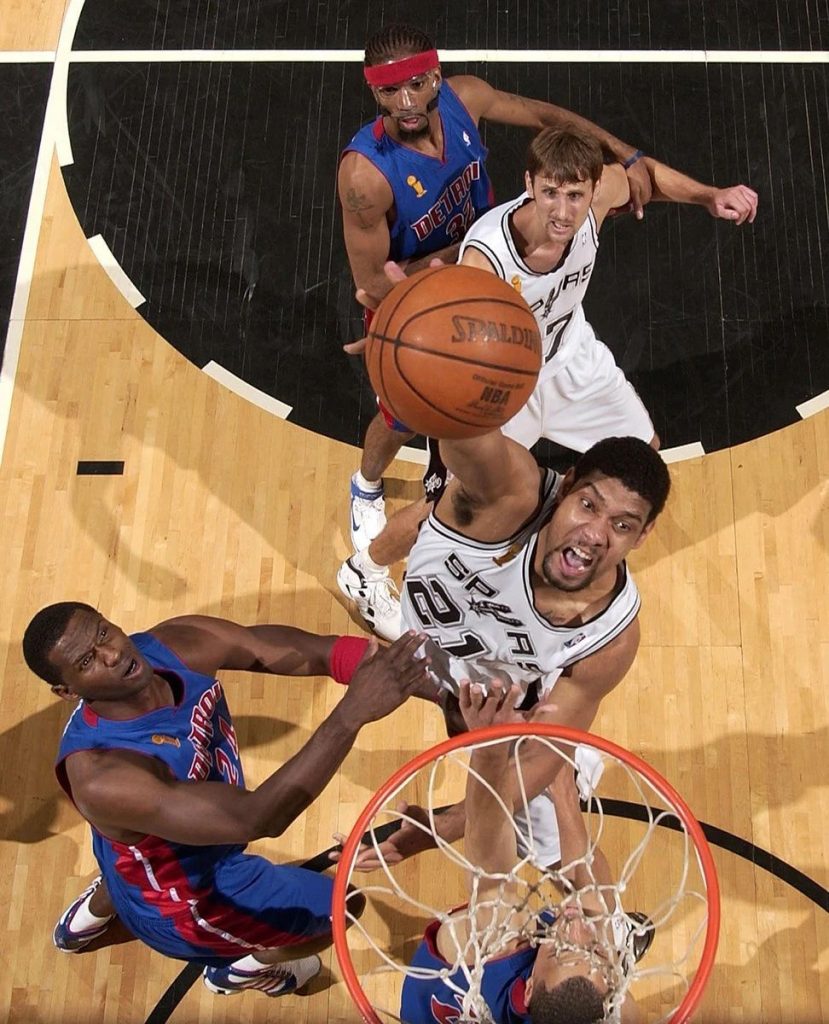
In this series, Duncan averaged 2.1 blocks per game. Although this is far from his amazing data in 2003, it is still an impressive number. After Duncan won the MVP for the last time, the Spurs basically began to transition from the Duncan era to the GDP era. When they later won the championship again, basically younger players became the backbone.
So the next two FMVPs fell into the hands of the other two. Kawhi Leonard in 2014 2014 was the year when Kawhi Leonard became famous. He made steady progress in his first three seasons with the Spurs. Until 2014, his glorious moment was shown on the finals stage, and he performed quite well in the game against LeBron James and the Miami Heat.
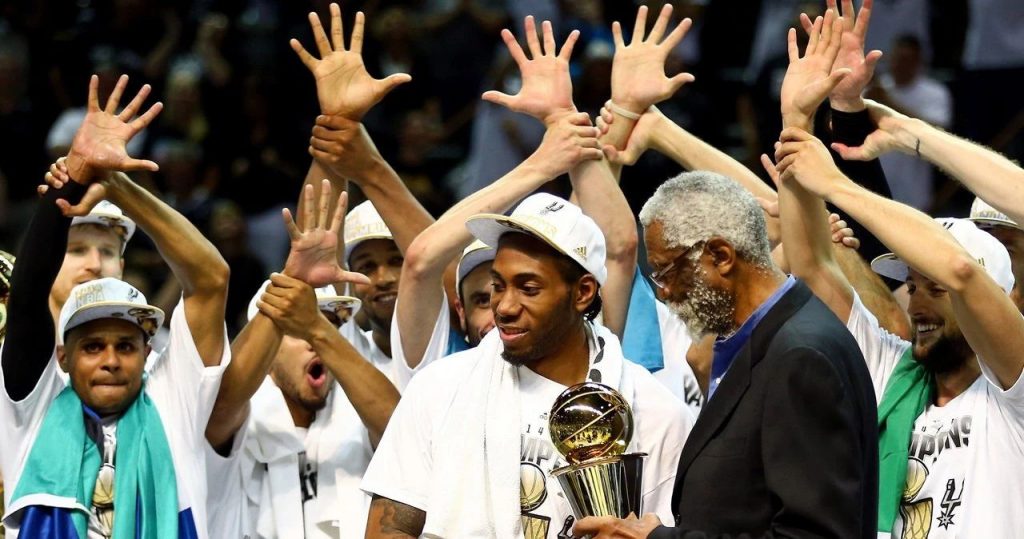
Leonard averaged 6.4 rebounds, 2 assists, 1.6 steals and 1.2 blocks per game, refreshing his data table. In the third game, he scored a jaw-dropping 29 points, which also made the San Diego State University player famous.
He was amazing under Miami’s tight defense, shooting an incredible 79% from the field. Most importantly, Leonard had an impressive performance in Game 5 and ended the series in San Antonio. He scored 22 points and 10 rebounds with a 70% shooting percentage, leading the Spurs to their fifth NBA championship.
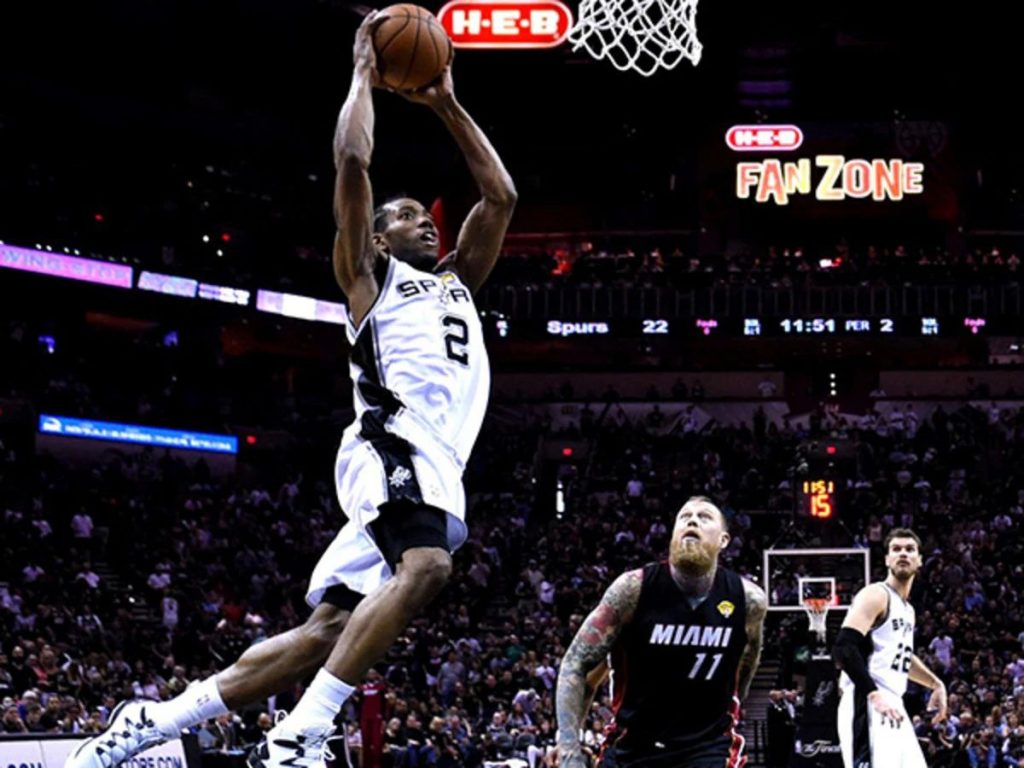
If this series is reversed, James will leave with the MVP because he averaged 28 points and 7 rebounds per game. He was still extremely sharp on the Heat, but his teammates were not strong enough, and his efforts were in vain.
Leonard may not be the best player in the 2014 NBA Finals, but he is the best player on the Spurs. After this series, he stepped into the ranks of superstars, and then he improved every year, but helplessly, his ending with the Spurs was not good. 3. Tony Parker in 2007 This is the first time for Tony Parker in 2007 that someone other than Tim Duncan took away the finals MVP. He is Tony Parker, he used this series to take a step towards the best point guard in the league, and he was also the first European to win this award.

Parker is the leading scorer in this series, averaging 24.5 points per game, surpassing LeBron James. The French’s shooting percentage is also as high as 56%, including 57% of the shots from outside the three-point line.
No matter who is defending, it is often easy to pass by stepping on the accelerator. Parker’s best performance was in the first game of the series, where he scored 27 points, 7 assists and 4 rebounds to win 85-76. This was the Spurs’ first victory, and they swept the series without mercy.

Duncan had a reason to win his fourth finals MVP. He averaged 18.3 points, 11.5 rebounds, 3.8 assists and 2.3 blocks per game. There are also two double-doubles in these figures. However, Parker looks like a star. His brilliant goals and outstanding performance have made his reputation even stronger. His impressive strength also established his own position in NBA history.
This round of competition is one of the most uneven finals since 2000. 2. Tim Duncan in 1999 Tim Duncan’s first two FMVP performances with the Spurs were almost the same. 2003 was an epic performance, but the performance in 1999 was incredible for this young big man.

Duncan’s powerful internal force in 1999 made the New York Knicks at a loss for him. He averaged 27.4 points, 14 rebounds, 2.4 assists and 2.2 blocks per game, combined with his dominance in the regular season, making him one of the stars of the NBA. He was only 22 years old at the time, but he seemed to have the attributes of becoming the next dominant big man, and hope of a future Hall of Famer.
In the first game, Duncan scored 33 points, 16 rebounds, 2 blocks and a 61% shooting rate. And this is just the beginning of his dominance series. In the fourth game, he continued to dominate both ends of the court with 28 points and 18 rebounds. David Robinson also scored 14 points and 17 rebounds. At that time, the power of the twin towers was indestructible, and coach Van Gundy on the sidelines felt irresistible.
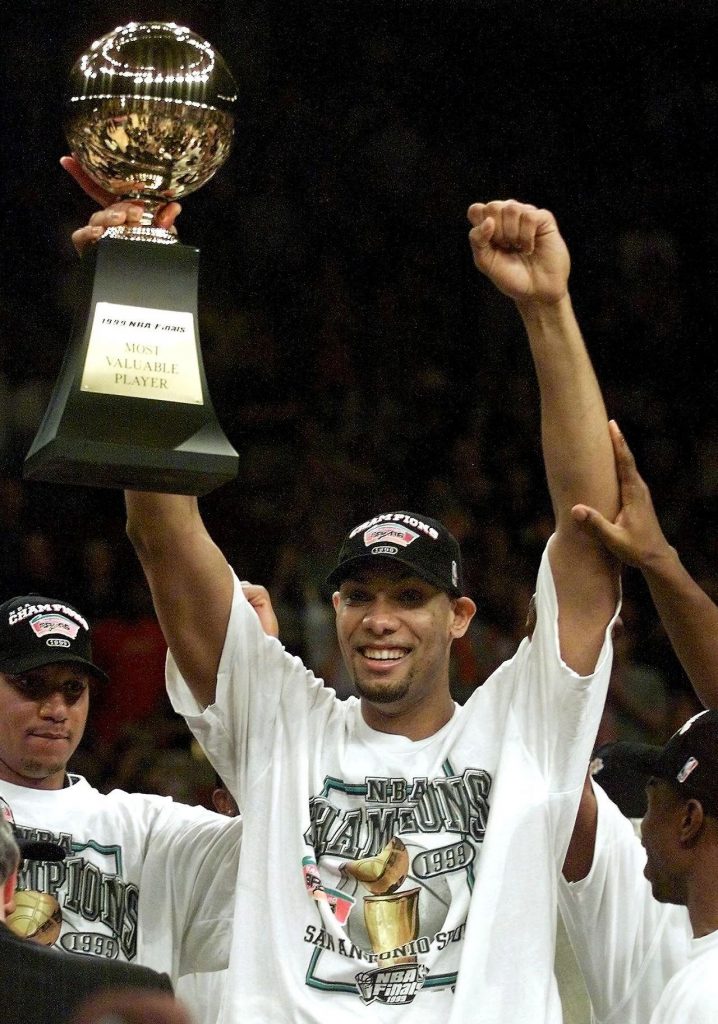
This was the first NBA Finals MVP won by young Duncan, and in 2000, he began to take over the dominance of the Spurs. So, this kicked off his best finals MVP. 1. Tim Deng in 2003 There is nothing wrong with Tim Duncan in 2003. The most impressive of Duncan’s three MVPs was the 2003 NBA Finals. He dominated the low post and did not accept any rebuttal, whether it was offense or defense.
The combination of Duncan and David Robinson dwarfed the New Jersey Nets. The brothers firmly controlled the inside and protected the basket. The most shocking thing is Duncan’s terrifying 5.3 blocks per game. Throughout the series, the Nets shot only a poor 37%, and Jefferson was the only starter to shoot more than 40%.

The number of rebounds in the basic skills is 20, 12, 16, 17, 17, and 20. He is the most dazzling star on the court. It was so dazzling that the Nets had nothing to do with him. In the first game, his stats were 20 rebounds plus 32 points, 7 blocks and 6 assists.
Kenyon Martin, who is also the champion, loses his temper in front of him. In Game 5, Duncan nearly scored 30+20 (29 points, 17 rebounds, 4 assists and 4 blocks), bringing the game back to the Holy City. In Game 6, Duncan gave the Nets no hope at all, producing 21 points, 20 rebounds, 10 assists, and 8 blocks, almost a quadruple double.

In the 2003 series, Duncan’s dominance is absolutely irrefutable. This is one of the Finals MVPs with the best data in NBA history. It is as famous as Shaquille O’Neal in 2000, Michael Jordan in 1993 and Hakeem Olajuwon in 1995.
Of course, sometimes we also think that if the selection of FMVP is based solely on scores, it is a bit unreliable. A player’s contribution is not only in scoring. For example, in 2005, some people thought that Manu should become FMVP. In 2013 If he wins the game, Danny Green may be an FMVP.
Comments